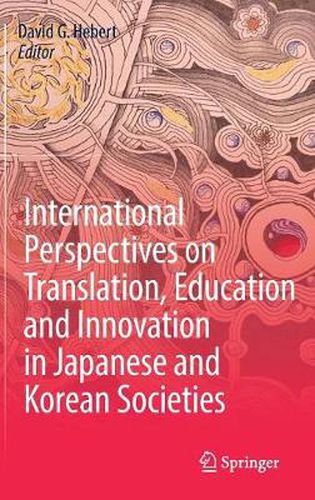Readings Newsletter
Become a Readings Member to make your shopping experience even easier.
Sign in or sign up for free!
You’re not far away from qualifying for FREE standard shipping within Australia
You’ve qualified for FREE standard shipping within Australia
The cart is loading…






This title is printed to order. This book may have been self-published. If so, we cannot guarantee the quality of the content. In the main most books will have gone through the editing process however some may not. We therefore suggest that you be aware of this before ordering this book. If in doubt check either the author or publisher’s details as we are unable to accept any returns unless they are faulty. Please contact us if you have any questions.
This book studies the three concepts of translation, education and innovation from a Nordic and international perspective on Japanese and Korean societies. It presents findings from pioneering research into cultural translation, Japanese and Korean linguistics, urban development, traditional arts, and related fields. Across recent decades, Northern European scholars have shown increasing interest in East Asia. Even though they are situated on opposite sides of the Eurasia landmass, the Nordic nations have a great deal in common with Japan and Korea, including vibrant cultural traditions, strong educational systems, and productive social democratic economies. Taking a cross-cultural and interdisciplinary approach, and in addition to the examination of the three key concepts, the book explores several additional intersecting themes, including sustainability, nature, humour, aesthetics, cultural survival and social change, discourse and representation.
This book offers a collection of original interdisciplinary research from the 25th anniversary conference of the Nordic Association for Japanese and Korean Studies (2013). Its 21 chapters are divided into five parts according to interdisciplinary themes: Translational Issues in Literature, Analyses of Korean and Japanese Languages, Language Education, Innovation and New Perspectives on Culture, and The Arts in Innovative Societies.
$9.00 standard shipping within Australia
FREE standard shipping within Australia for orders over $100.00
Express & International shipping calculated at checkout
This title is printed to order. This book may have been self-published. If so, we cannot guarantee the quality of the content. In the main most books will have gone through the editing process however some may not. We therefore suggest that you be aware of this before ordering this book. If in doubt check either the author or publisher’s details as we are unable to accept any returns unless they are faulty. Please contact us if you have any questions.
This book studies the three concepts of translation, education and innovation from a Nordic and international perspective on Japanese and Korean societies. It presents findings from pioneering research into cultural translation, Japanese and Korean linguistics, urban development, traditional arts, and related fields. Across recent decades, Northern European scholars have shown increasing interest in East Asia. Even though they are situated on opposite sides of the Eurasia landmass, the Nordic nations have a great deal in common with Japan and Korea, including vibrant cultural traditions, strong educational systems, and productive social democratic economies. Taking a cross-cultural and interdisciplinary approach, and in addition to the examination of the three key concepts, the book explores several additional intersecting themes, including sustainability, nature, humour, aesthetics, cultural survival and social change, discourse and representation.
This book offers a collection of original interdisciplinary research from the 25th anniversary conference of the Nordic Association for Japanese and Korean Studies (2013). Its 21 chapters are divided into five parts according to interdisciplinary themes: Translational Issues in Literature, Analyses of Korean and Japanese Languages, Language Education, Innovation and New Perspectives on Culture, and The Arts in Innovative Societies.